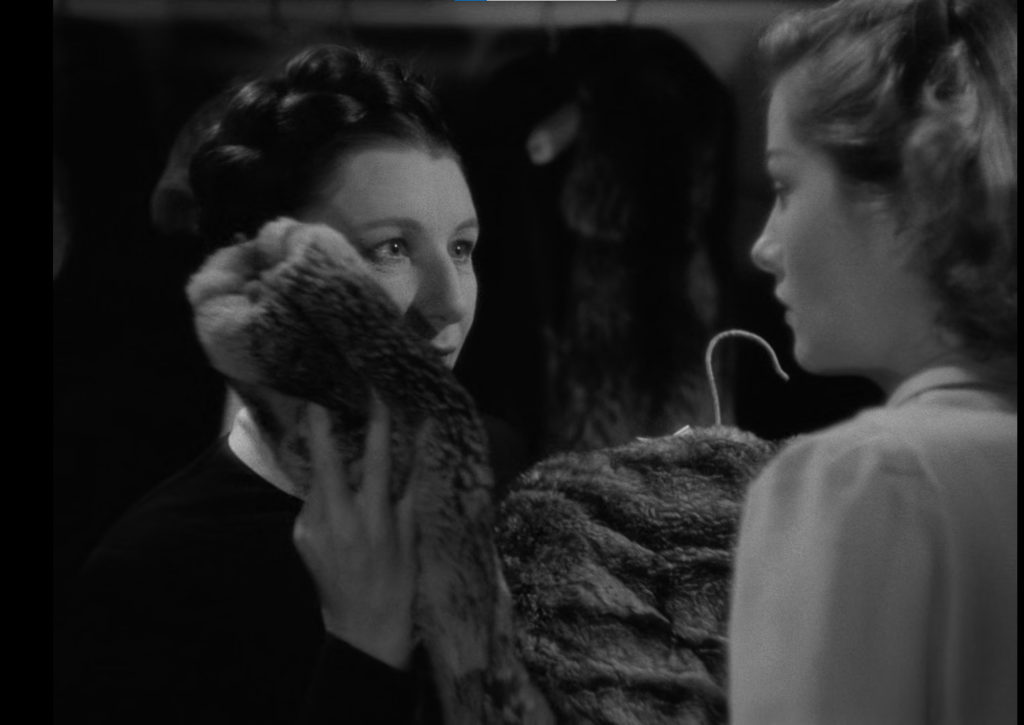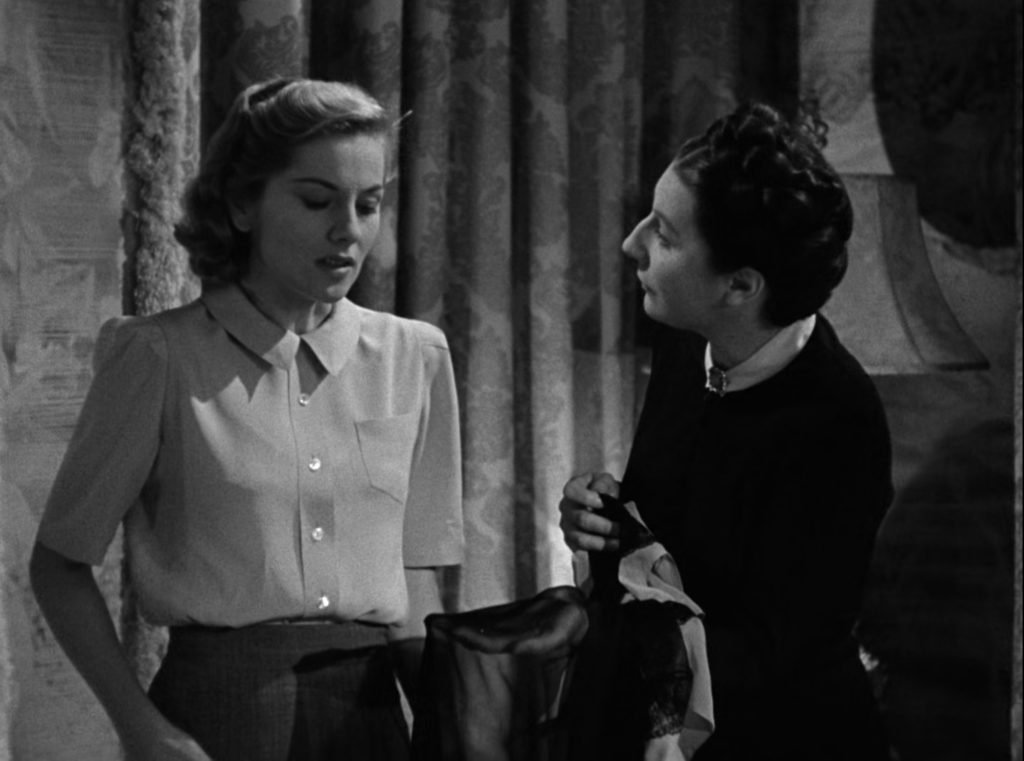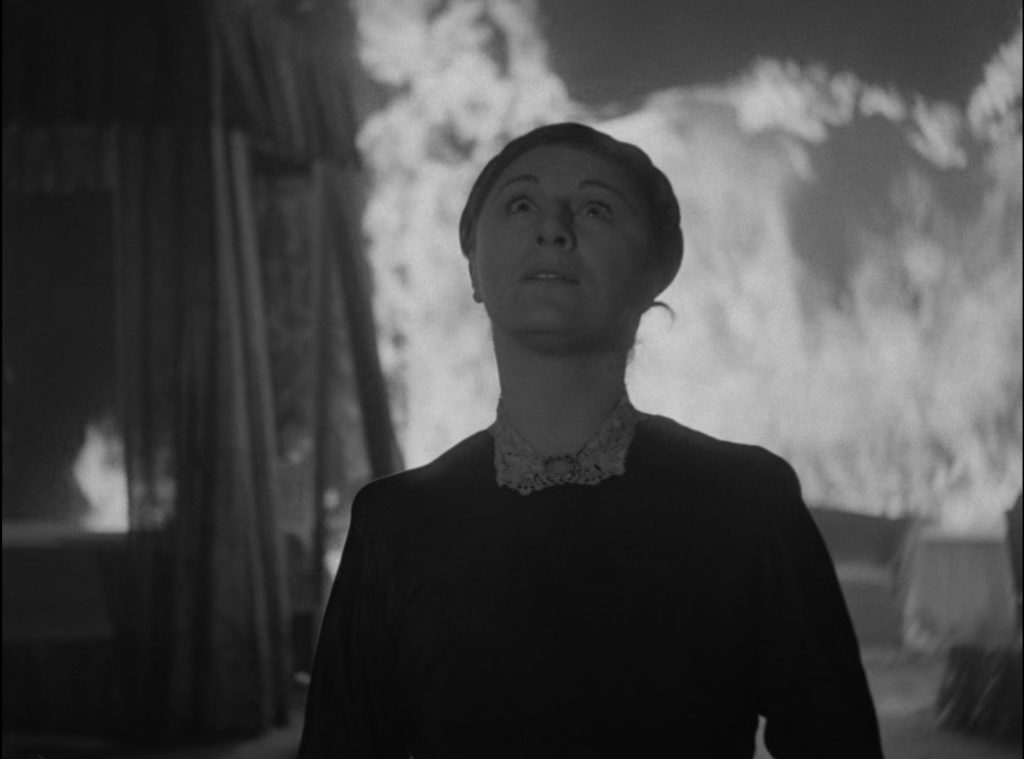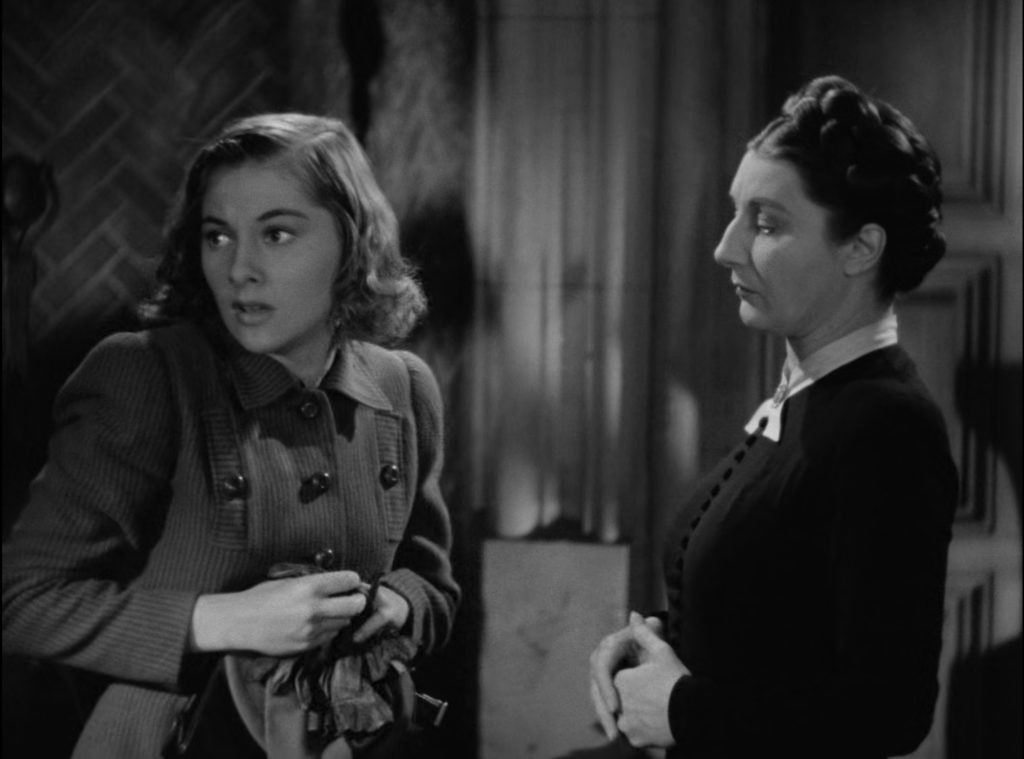| Dylan Walker |

Rebecca plays at the Heights Cinema on Thursday, April 13. Visit trylon.org for tickets and more information.
Warning: plot spoilers below!
“Last night I dreamed I went to Manderley again.” As the camera passes through a gate and roves through the charred Manderley estate in the opening shot of the 1940 classic Rebecca, I am suddenly taken back in time as if I were Joan Fontaine’s narrator.
When I was growing up in rural southern Missouri, I attended a summer camp for “academically gifted and talented youth” (read: big ol’ nerds). We participated in classes throughout the day and middle school shenanigans at night. In eighth grade, my best friend and I agreed to take an afternoon class analyzing the films of Alfred Hitchcock. Rebecca was the second film we watched, and even though it was twelve years between my original viewing and my rewatch for this article, it occupied an unusually large amount of space in my brain in those years. I would go on to borrow the original novel, Daphne du Maurier’s 1938 Rebecca, from my high school library and obsessively read it under my desk while pretending to focus on Algebra II. Though I could not have explained it at the time, the movie and the book were playing a crucial role in my identity formation.
To take a step back, Rebecca is the first American film directed by Alfred Hitchcock and his first working with producer David O. Selznick (of Gone with the Wind fame, among others). Laurence Olivier plays the dashing yet temperamental widower Maxim de Winter, who owns a large family estate called Manderley. Joan Fontaine stars as his wife, who marries Maxim after a short courtship at Monte Carlo. She’s much younger than Maxim. She’s naive, but she’s desperately in love with him and willing to try to manage the massive Manderley. While Maxim’s new wife (hereafter referred to as Mrs. de Winter) remains unnamed throughout the film, the title character Rebecca remains unseen. Rebecca is Maxim’s first wife, who drowned a year before the events of the film take place. Despite her absence, Rebecca looms large over the film—Maxim can’t get her out of his mind, Mrs. de Winter can’t help but feel she is constantly being compared to Rebecca and falling short of her beauty and wit, and Rebecca’s possessions are all over Manderley. Romance and suspense ensue.
All of this was dwarfed by one character for me, though: Mrs. Danvers. Mrs. Danvers (played by Judith Anderson) is the housekeeper at Manderley and cast as one of the story’s villains from the very first shot of her introduction to Mrs. de Winter. Mrs. de Winter is afraid of her and we are supposed to be as well. She is cold in her demeanor, lit with harsh shadows, and woeful violins cue every time she’s onscreen. My friend and I embraced her villainous portrayal. In fact, we laughed at her. The scene where she shows Mrs. de Winter Rebecca’s belongings in the west wing of the house drew a particular roar as we debriefed after class one day. “Look, you can see my hand through it!” we shrieked as we imitated the scene in the west wing of Manderley where Mrs. Danvers strokes Rebecca’s negligee (to the horror of Mrs. de Winter). We laughed because it seemed outrageous to us. How could you love another woman to this extent, picking up her underwear and putting it to your cheek?

A queer reading of Mrs. Danvers and Rebecca’s relationship is nothing new. There’s plenty of evidence for it in the movie, even with Hays Code restrictions placed on it. Maxim’s sister remarks over lunch that Mrs. Danvers “simply adored Rebecca” (once again to the tune of overwrought violins that may as well scream “something is not right here”). The long, pivotal scene in the west wing is beautifully played by Judith Anderson and shows the housekeeper at her most tender, pining over Rebecca’s coats and pillowcases. Mrs. Danvers even (spoiler alert) ends up giving her life for Rebecca and her memory.

Even if this interpretation is easy to read, it lay just outside of my grasp as a teenager. In my defense, my only exposure to queer women prior to that day was reading a magazine article about The L Word, asking a teacher what the “L Word” in question was, and not actually getting an answer. It took me another two years after viewing Rebecca to realize I was gay.[1] It was a terrifying time, full of self-hatred and the anxiety of keeping a big secret. Growing up where I did certainly didn’t help. But you know what else didn’t help? At night I would lie awake imagining Mrs. Danvers. “Look, you can see my hand through it!” echoed in my brain, as did the peals of laughter our imitations of her brought.
Is this what it means to be gay? I thought to myself. Being mocked? People being scared of me? Of course, there’s more to being queer than villainy and comic relief, from euphoria to pain to a lingering passion for Tegan and Sara. But at the time Mrs. Danvers’s life of grief and obsession seemed to be my only option.
I do not know what Hitchcock’s intent with this character was, whether he personally hoped we would fear her or pity her. I do know that several aspects of the movie suggest adherence to the trope of queer women as villains ready to destroy lives as vengeance for their broken hearts. For example, Hitchcock made changes from the book’s Mrs. Danvers (aging her down and removing some of her backstory to make her into a more otherworldly figure without a past). He also refused to cut scenes that concerned Joseph Breen, head of the Production Code Administration at the Motion Picture Producers and Distributors of America. Notably, Breen said the underwear scene reveals “the quite definite suggestion that the first Mrs. de Winter was a sex pervert,” a phrasing which scholar Rhona J. Berenstein describes as “intentionally elusive but decidedly allusive” to Rebecca’s bisexuality or homosexuality.[2] It may lend a certain amount of complexity to a character, but it also has the effect of painting the future as inevitably bleak for those growing into themselves.

Rewatching Rebecca to write this post, I realized I have a stronger appreciation for the film’s twists and turns, the evolution of Mrs. de Winter from clueless young woman to Maxim’s hardened accomplice, and the crucial role Mrs. Danvers plays in the film’s final act. Yet I can’t help but feel sorry for young Dylan laughing at Mrs. Danvers’s “bizarre” antics in an effort to cover up my fascination for the character and her subtext. She may be one of Hitchcock’s classic antagonists, but the fact that she was my only representation for so many years of what queer life (or at least implied queer life) is like saddens me. I, and so many other people, deserved better.
NOTES
[1] And another three years to realize I was transgender. That’s an essay for another time, though.
[2] Rhona J. Berenstein, “Adaptation, Censorship, and Audiences of Questionable Type: Lesbian Sightings in “Rebecca” (1940) and “The Uninvited” (1944),” Cinema Journal, Vol. 37. No. 3 (Spring 1998), p. 17-18, https://doi.org/10.2307/1225825
Edited by Olga Tchepikova-Treon
